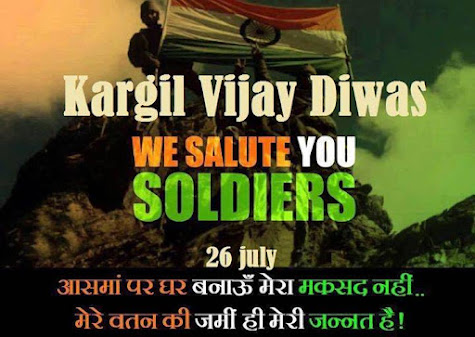Why Kargil War Happened ?
The Kargil War, a significant armed conflict between India and Pakistan in 1999, marked a critical chapter in the long-standing rivalry between the two neighboring nations. Spanning over two months, the war resulted in thousands of casualties and brought the world's attention to the volatile region of Kashmir. In this blog, we will delve into the causes and consequences of the Kargil War, shedding light on the factors that led to this intense military engagement.
Causes of the Kargil War:
The Kashmir Issue:
The primary cause of the Kargil War can be traced back to the unresolved territorial dispute over the region of Kashmir. Both India and Pakistan have claimed Kashmir as their own, and this longstanding conflict has led to several wars and skirmishes over the years. The Kargil War was, in essence, an extension of this broader issue.
Infiltration of Pakistani Troops:
During the spring of 1999, Pakistani troops, disguised as militants, crossed the Line of Control (LoC) and infiltrated into Indian-controlled territory in the Kargil district of Jammu and Kashmir. This strategic move aimed to take advantage of the difficult terrain and surprise the Indian forces.
Pakistani Objectives:
Pakistan's main objectives behind the Kargil intrusion were to internationalize the Kashmir issue, disrupt Indian control over the region, and draw global attention to the dispute. They believed that their actions would force India into negotiations and potentially push for a resolution.
Indian Response:
The Indian military discovered the intrusion in May 1999 and responded promptly with a large-scale military operation to evict the Pakistani forces from the captured posts. The intense fighting that ensued resulted in heavy casualties on both sides and led to an escalation of hostilities.
Consequences of the Kargil War:
Loss of Lives and Destruction:
The Kargil War led to a significant loss of lives and resources on both sides. The rugged terrain and harsh climate added to the difficulties faced by the soldiers, making it one of the most challenging conflicts in the region's history.
Diplomatic Strain:
The war strained the diplomatic relations between India and Pakistan, and both countries faced international pressure to find a peaceful resolution to the conflict. Several countries and international organizations called for restraint and a peaceful dialogue.
Impact on Indo-Pak Relations:
The Kargil War further deteriorated the already tense relationship between India and Pakistan. It brought to the forefront the deep-rooted animosity and mistrust between the two nations, making future peace talks and negotiations more challenging.
International Community's Response:
The international community played a crucial role in urging both countries to find a peaceful resolution to the conflict. The United States and other nations actively engaged in diplomatic efforts to mediate between India and Pakistan and bring an end to the hostilities.
When and why did the Kargil War start?
The Kargil War started in May 1999 and lasted until July 1999. It was a conflict between India and Pakistan over the disputed region of Kashmir.
The war began when Pakistani troops, disguised as militants, crossed the Line of Control (LoC) and infiltrated Indian-controlled territory in the Kargil district of Jammu and Kashmir. The infiltration was a strategic move by Pakistan to take advantage of the difficult terrain and surprise the Indian forces.
The primary reason for the Kargil War was the unresolved territorial dispute over the region of Kashmir. Both India and Pakistan have claimed Kashmir as their own since their independence from British rule in 1947. The dispute over Kashmir has led to several wars and skirmishes between the two countries over the years, and the Kargil War was an extension of this longstanding conflict.
Pakistan's objectives behind the Kargil intrusion were to internationalize the Kashmir issue, disrupt Indian control over the region, and draw global attention to the dispute. On the other hand, India responded promptly to the intrusion and launched a large-scale military operation to evict the Pakistani forces from the captured posts, leading to intense fighting and heavy casualties on both sides.
The Kargil War had significant consequences, including loss of lives and destruction, diplomatic strain between India and Pakistan, and international pressure for a peaceful resolution. It further deteriorated the already tense relationship between the two nations and emphasized the need for dialogue and peaceful negotiations to resolve the Kashmir dispute.
Kargil War Vijay Diwas, also known as Kargil Vijay Diwas, is a day to commemorate India's victory in the Kargil War of 1999. The conflict took place between May and July 1999, when Pakistani forces infiltrated into Indian territory in the Kargil sector of Jammu and Kashmir.
On July 26, 1999, the Indian armed forces successfully recaptured the last remaining posts that had been occupied by Pakistani troops, and the war officially came to an end. The day of victory, July 26th, was declared as Kargil War Vijay Diwas to honor the brave soldiers who sacrificed their lives in the line of duty and to celebrate India's triumph in pushing back the Pakistani forces.
Kargil War Vijay Diwas is observed across India with various events, including memorial services, wreath-laying ceremonies, and parades to pay tribute to the soldiers' bravery and commemorate the nation's victory. It serves as a reminder of the sacrifices made by the armed forces to protect the country's sovereignty and territorial integrity.
Conclusion:
The Kargil War stands as a stark reminder of the complexities and sensitivity surrounding the Kashmir issue. It was a conflict that resulted from unresolved disputes, territorial ambitions, and deep-rooted animosity between India and Pakistan. The war's consequences continue to influence the relations between the two nations, making it imperative for both sides to engage in dialogue and seek peaceful solutions to their differences. Only through open communication and cooperation can the seeds of future conflicts be effectively thwarted, leading to lasting peace in the region.




Comments